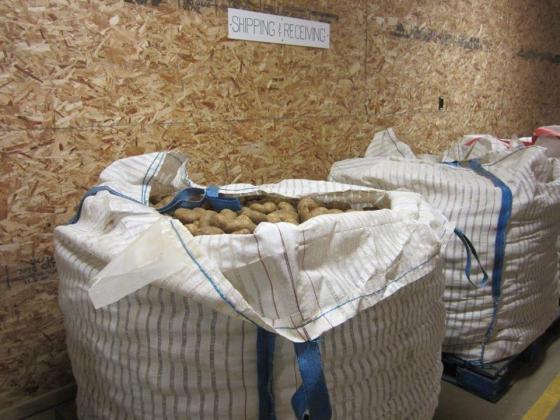Posted March 3, 2015 at 12:11pm by Marcella Houghton
Funding Goal Met to Creatively Increase Vermont’s Food Security

Salvation Farms has met a fundraising goal of $156,000 to renovate a building at the Southeast State Correctional Facility in Windsor, Vermont, where they engage inmates to sort and package unmarketed, surplus produce for distribution around the region. The majority of donations came from within Vermont; more than 130 individuals and businesses provided roughly 45% of funding while ten foundations filled the gap with $82,500.
Since early 2013, Salvation Farms has worked with representatives from the Vermont Department of Buildings and General Services and Department of Corrections to define the infrastructure required to expand this farm-surplus management project. Renovation plans include weatherization, a loading dock, cooler instillation, and bringing water to the building. This expansion will increase shipping and receiving capacity, letting the facility receive larger volumes and a greater diversity of surplus crops. Salvation Farms anticipates construction beginning within the calendar year.
Salvation Farms began their relationship with the Department of Corrections in 2012, and the prison project became a central part of their Vermont Commodity Program. Piloting with limited capacity over the past two years, Salvation Farms has led inmate crews to clean and pack close to 250,000 pounds of surplus produce in the facility.
Some of the resulting fresh food has been distributed to institutional sites such as the Windsor Schools. However, the bulk of the packaged produce is distributed to charitable food sites like the Lamoille Community Food Share and through the Vermont Foodbank’s network. By offering more fresh produce to these community hubs, the program at the prison aligns with multiple Farm to Plate goals, most specially increasing access to fresh, nutritionally balanced food and expanding food processing and manufacturing capacity.
“The Vermont Commodity Program provides inmate crews with workforce development skills relevant to Vermont’s expanding agricultural economy, helps increase food rescue processing infrastructure which in turn increases the amount of local food available for Vermonters at charitable food organizations throughout the state—all of which align directly with Vermont’s Farm to Plate goals to strengthen the food system,” states Rachel Carter, communications director of Vermont’s Farm to Plate Initiative.
In piloting the concept of sorting and packaging produce at the prison, Salvation Farms has sourced product from only a few farms. This funding and the anticipated program expansion increase their ability to promote the program as a reliable resource for a multitude of farms and food sites in Vermont and beyond.
“This facility, the engagement of incarcerated individuals, and the growth of this program overcomes major obstacles to capturing more unmarketed crops in order to address our region’s food and nutritional needs,” says Theresa Snow, founder and director of the organization. A recent report assessing how local infrastructure can benefit the charitable food system, written by an Emerson Hunger Fellow serving in Vermont, backs her up: “There are three main factors that can be adjusted to keep costs low when processing for the charitable food system: the cost of labor, the cost of raw materials, and the cost of maintaining the processing facility.”
The future success of this locally grown food security program is made possible by the contributions of many Vermont residents and businesses, but also from the support of the Vermont Department of Correction and the Department of Building and Grounds.
For more information about Salvation Farms visit SalvationFarms.org or call 802-888-4360.
